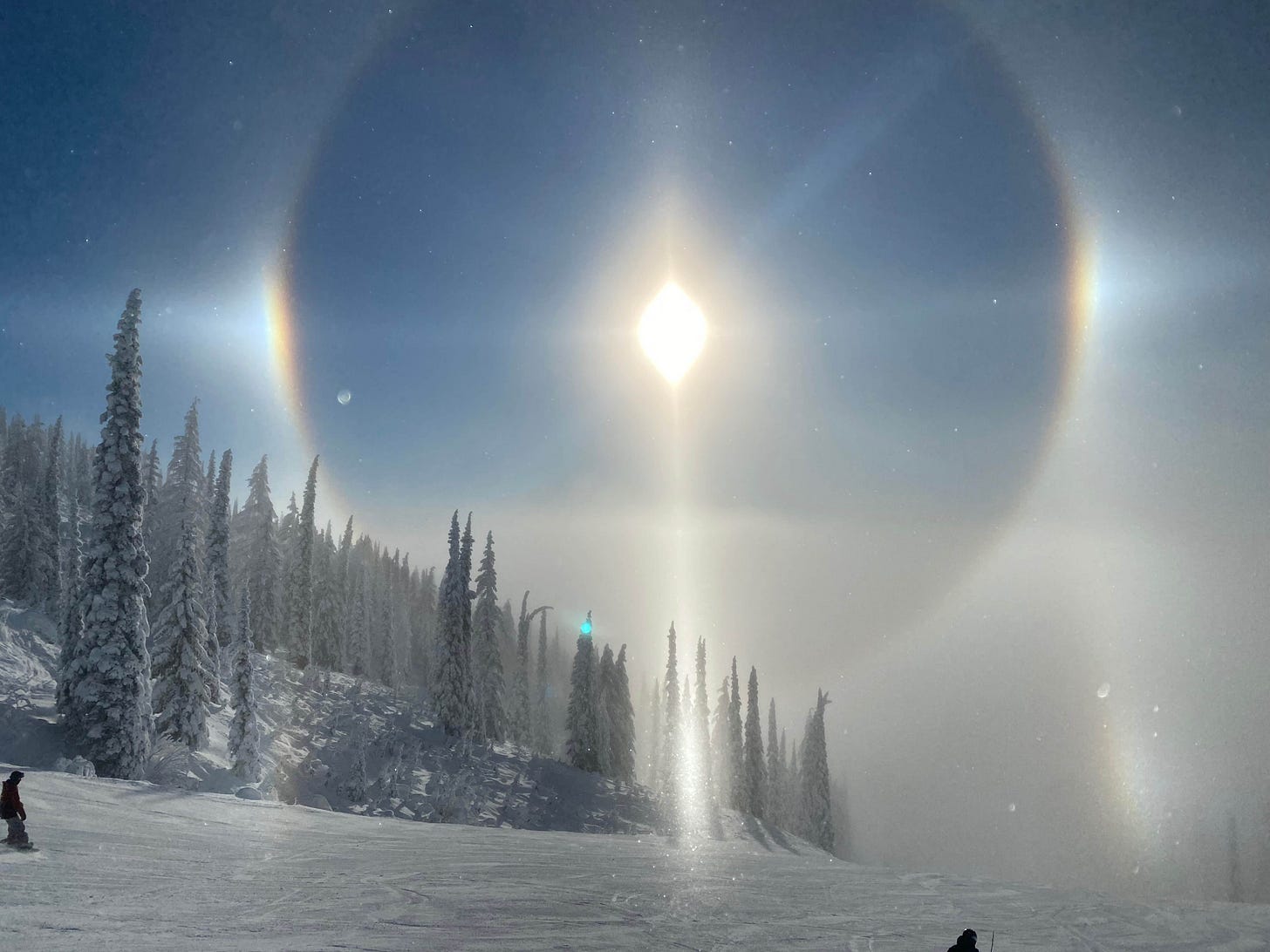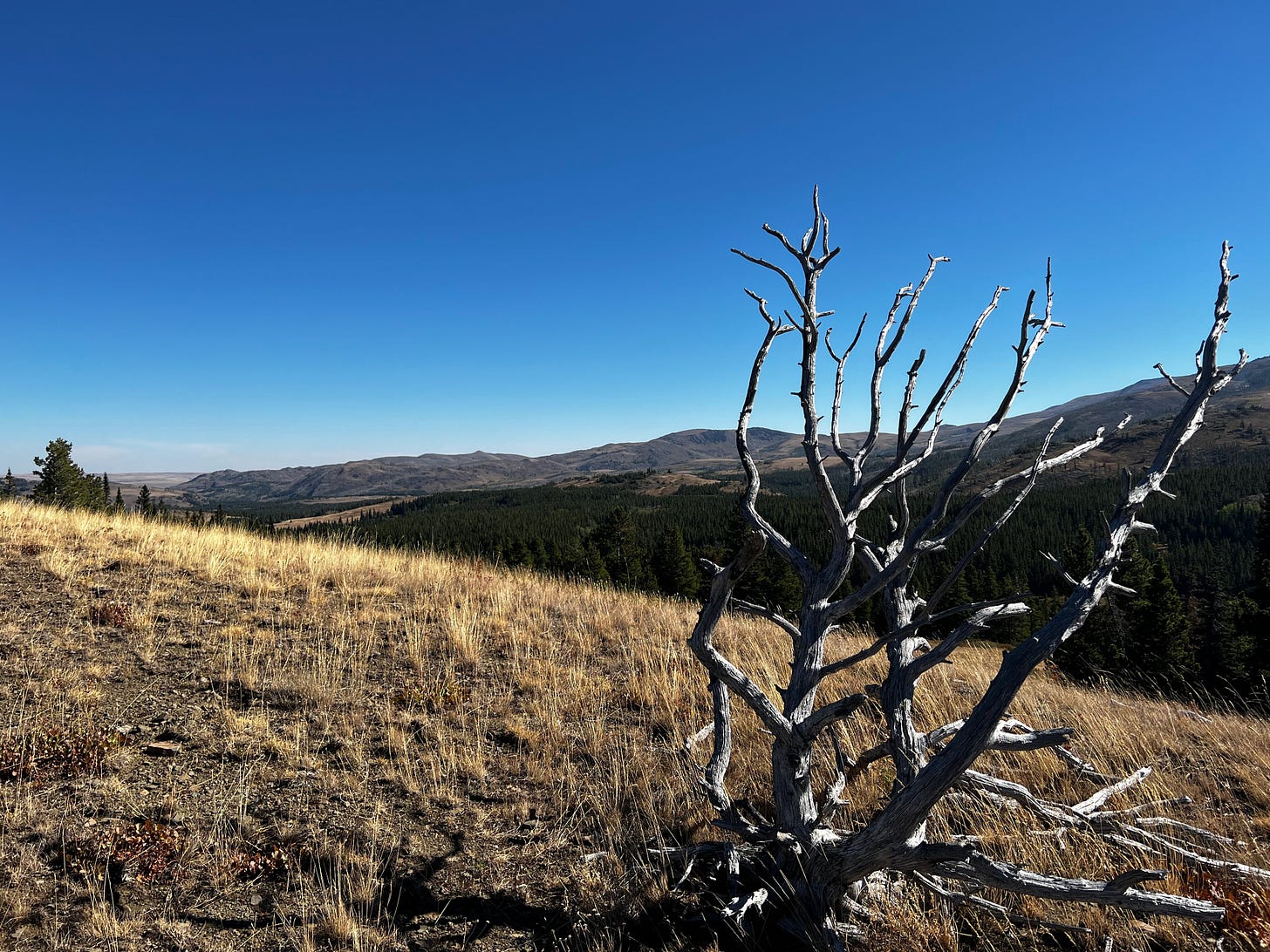“We have to accept that our world changes radically and perpetually, and that it changes with us and in us, and that we have an obligation to perceive, to intuit, to sense this change. That’s how we reach utopia.”
—The Archipelago Conversations, Édouard Glissant and Hans Ulrich Obrist
There are some days when I’m out walking around town, watching watching watching, and the sky literally takes my breath away. It’s rarely because of a stunning sunset, though those happen, too; it’s moments like the one pictured above, when the varied texture of the clouds and the range of blue-gray color make me hungry to stand and watch for hours. Especially in winter, when for several months at a time we rarely see the sun. There are spots, and moments, when the sky is so subtly its own perfect thing that you can almost feel it breathe.
The beginning of a new year seems like a good time for a brief book update. I’ve been working on the research side of No Trespassing, so far almost exclusively focused on land ownership. There’s a lot of reading to do, but there are also two visits I wanted to make. One is to the ranch my mother grew up on, outside of Geraldine, Montana. The family who owns and works it bought it from my grandfather in the mid-1990s. I haven’t been there since I was a child.
My mother has written and talked about the place a lot, but I’d like to visit myself to get a sense of it. The first chapter of the book is about ownership of land, and includes discussion of enclosures of the commons and land theft in North America, including the Homestead Act and my own family’s history related to it. I love Montana more than I can usually express. It’s made me who I am. But I was only born here because the land my relatives owned was stolen for the benefit of homesteaders like them. I might not possess that land myself now, but I’m still here because of it, and want to face what that means.
The second visit is to the Badger-Two Medicine area right against the Rocky Mountain Front. It’s a place I’ve been a little obsessed with since even before I moved back to Montana in 2014. Sacred land to the Blackfeet Nation, this area is currently “owned” by the U.S. Forest Service, and has been the subject of numerous lawsuits regarding oil leases issued in the early 1980s. The Badger-Two Med isn’t a big subject in the book, but I mention it in the Introduction because the oil leases pose critical questions about ownership, taking, right of use, and the changing story of private property rights that are central to what I write about.
Finding a sense of place when I’m writing is really important to me, so even though the subject revolves around the Badger-Two Med’s legal case, I didn’t want to write about it without having some sense of what was at stake, even a tiny sense. Last fall I got very lucky and saw a notice for the annual gathering of the Glacier-Two Medicine Alliance, an organization that was formed in the 1980s to fight oil leases in the Badger-Two Medicine. They’re still at it because there’s still one lease remaining, and I learned a great deal from presentations by the Alliance, most especially from the Blackfeet members who gave talks, and from the second day’s hike into the hills where the oil lease is located (this hike was where my favorite aspen grove pictures were taken).
I’m hoping to have time to really dig into writing and revision of the Introduction and first chapter of No Trespassing over the next two–three months, after which I’ll publish them here for paid subscribers (though, as always, if you can’t or don’t want to pay, just email me the code word “tribble” and I’ll get you a paid subscription).
After that, it’ll be on to research for the second chapter, which is about water.
Though really, every time I think about it, it’s all about water. Doesn’t every river and cloud begin with a breath?
The sky breathes, animals and trees breathe. Every one of those breaths carries a little water, mostly unnoticed by humans. Rivers and pounding seashores, smokestacks and campfires, glaciers and tectonic plates, you and me. It’s all breathing, all movement, all exchanges of atoms combined into gasses we take for granted but depend on for our lives, our health—even our moods. A humid day, like the kind that blanketed every summer when I lived in upstate New York, leaves me in a state of grouchiness that’s difficult to shake.
I think this is one of the reasons I’ve never found weather boring: it’s always felt alive to me. One recent day it was -40°F (which is also -40°C, fun fact) here with wind chill, cold enough to get frostbite in a thoughtless moment; a few days later it was literally raining and snow was sliding off the trees. This week temperatures have settled into a moderate, “normal” winter range and it’s been snowing for a couple of days.
We’ll get some more snow, and calm winds. Most days it’ll be overcast with a heavy gray inversion layer over my town. If I go skiing and manage to get above the clouds, I might be fortunate enough to see a magnificent sun halo.
And in a few months the damp smell of a Chinook wind might be in the air, and the clouds will start developing a rumpled-silk quality that I find fascinating, and our days will get long and eventually it will get hot, or maybe summer will be full of rain and thunderstorms like it was when I was a child, or it’ll snow and then flood in mid-June like it did last year. Or wildfire smoke will choke this entire region. And no matter what, the stars and moon will be up there reminding me of the seemingly eternal time frames in which my life—all of our lives—barely have time to make a memory.
There’s really nothing more interesting than the weather. It reminds me that we exist and evolved on a living, breathing planet. That we’re walking and reading and raging and loving within the largest unseen river we can possibly imagine. And that its eddies and flows and turbulence and rapids and waterfalls and riffles and floods will determine our lives, whether we will it or not.
In the Badger-Two Medicine, looking out toward the plains of eastern Montana.
Some stuff to read or listen to:
By Vaia Errett in Winter 2022 of Montana Quarterly, “Holding Water,” an article about the increasingly intractable tension between those who hold water rights and all of those who need water on the Jefferson River near the Tobacco Root Mountains. Print only, unfortunately, but this article is worth reading if you can get a copy, for its attempt to take a more straightforward look at the impossibility of continuing to allocate water based on first-in-time rights, and the seeming impossibility of changing that system.
Many of you are participating in my Threadable reading circle on Land Ownership. I’ve mentioned the reading circle on Water Politics and the World a few times because I’ve become a bit of a fangirl and got hooked on the readings. It’s led by Varsha Verkatasubramanian, a dam historian and author of an article in Current Affairs about the history and problems that led to the collapse of two dams in northern Michigan. On dams: “Whole valleys worth of trees are killed in the process. Bacteria in the water decompose the plants, generating carbon dioxide and methane. This is why dams are a critical source of greenhouse gasses—the world’s 52,000 largest dams are responsible for over 4 percent of the total warming from human activities. Reservoirs contribute 25 percent of human-caused methane emissions, the largest single source in the world.”
The Building Local Power podcast on shifting paradigms of profit and the public good, and the history of the Institute for Local Self-Reliance.
A great conversation on the Reframing Rural podcast about class inequality, cultural extraction, and rural gentrification with Butte-based journalist (and author of the incredible forthcoming nonfiction book Blood Money, which I have read and recommend) Kathleen McLaughlin: “Is it that much different that someone buys a multimillion dollar home at the Yellowstone Club and spends several weeks a year there, or a couple of weeks a year there and helps drive up the prices for working class Montanans. Is that that different than the Copper King, William Clark, owning mansions all around the world that were built with wealth from Butte Copper? I’m not sure. I mean, it’s just a different pattern of extraction.” (Link includes a transcript for those who’d rather read than listen.)
A subscriber (thanks, Charles!) sent me this Economist article about the history and evolution of the city grid, and how to think about city layouts that serve people rather than cars.
In my last essay post, I referenced hearing the line “it’s not about critical mass; it’s about critical connection” recently and said I couldn’t remember where from. It was via another subscriber (thanks, Jake!), who had sent me an obituary about the person it comes from, activist and philosopher Grace Lee Boggs: “Always the philosopher, Grace never had the final answer but would push us to think dialectically, to learn from the past but not get stuck in it.”
Along the lines of finding hope or its equivalents when forces and circumstances are arrayed against it—and in line with my longstanding belief that science fiction is the best fiction because it helps us truly imagine different ways of being, especially with Octavia Butler—“How to Survive in a Broken World,” Jesmyn Ward on the optimism and empathy of Octavia Butler in Literary Hub: “This is the real gift of her work, a gift that shines in Bloodchild: in inviting her readers to engage with darker realities, to immerse themselves in worlds more disturbing and complex than our own, she asks readers to acknowledge the costs of our collective inaction, our collective bowing to depravity, to tribalism, to easy ignorance and violence. Her primary characters refuse all of that.”







I love the talk about breath. In Anishinaabe cosmology, we believe all people were created when Kitchi Manitou took a handle of soil from Mother Earth from each of the four directions and placed them in a shell, then breathed into it. What emerged on the other side was the first human. If that isn't a nod to the reality that we are all made of breath, of warm, holy, humid vapor, what is?
Octavia Butler was a true gift.